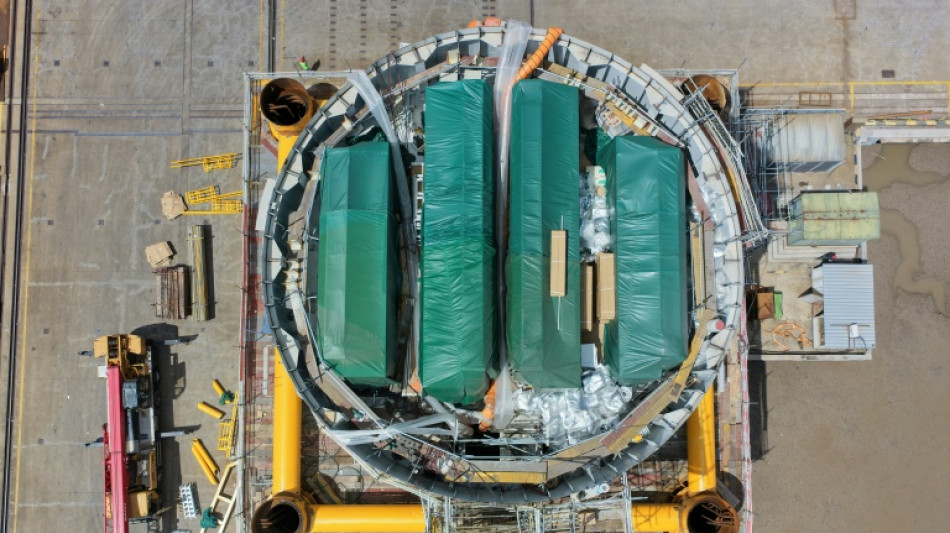
-
 'Animals in a zoo': Swiatek backs Gauff call for more privacy
'Animals in a zoo': Swiatek backs Gauff call for more privacy
-
Japan PM's tax giveaway roils markets and worries voters

-
 Amid Ukraine war fallout, fearful Chechen women seek escape route
Amid Ukraine war fallout, fearful Chechen women seek escape route
-
Rybakina surges into Melbourne semis as Djokovic takes centre stage

-
 Dollar struggles to recover from losses after Trump comments
Dollar struggles to recover from losses after Trump comments
-
Greenland blues to Delhi red carpet: EU finds solace in India

-
 Will the EU ban social media for children in 2026?
Will the EU ban social media for children in 2026?
-
Netherlands faces 'test case' climate verdict over Caribbean island

-
 Rybakina stuns Swiatek to reach Australian Open semi-finals
Rybakina stuns Swiatek to reach Australian Open semi-finals
-
US ouster of Maduro nightmare scenario for Kim: N. Korean ex-diplomat

-
 Svitolina credits mental health break for reaching Melbourne semis
Svitolina credits mental health break for reaching Melbourne semis
-
Japan's Olympic ice icons inspire new skating generation

-
 Safe nowhere: massacre at Mexico football field sows despair
Safe nowhere: massacre at Mexico football field sows despair
-
North Korea to soon unveil 'next-stage' nuclear plans, Kim says

-
 French ex-senator found guilty of drugging lawmaker
French ex-senator found guilty of drugging lawmaker
-
US Fed set to pause rate cuts as it defies Trump pressure

-
 Sleeping with one eye open: Venezuelans reel from US strikes
Sleeping with one eye open: Venezuelans reel from US strikes
-
Venezuela's acting president says US unfreezing sanctioned funds

-
 KPop Demon Hunters star to open Women's Asian Cup
KPop Demon Hunters star to open Women's Asian Cup
-
Trump warns of 'bad things' if Republicans lose midterms

-
 Russian strikes in Ukraine kill 12, target passenger train
Russian strikes in Ukraine kill 12, target passenger train
-
With Maduro gone, Venezuelan opposition figure gets back to work

-
 Celebrities call for action against US immigration raids
Celebrities call for action against US immigration raids
-
Rubio to warn Venezuela leader of Maduro's fate if defiant

-
 Denver QB Nix 'predisposed' to ankle injury says coach
Denver QB Nix 'predisposed' to ankle injury says coach
-
Lula, Macron push for stronger UN to face Trump 'Board of Peace'

-
 Prass stunner helps Hoffenheim go third, Leipzig held at Pauli
Prass stunner helps Hoffenheim go third, Leipzig held at Pauli
-
Swiss Meillard wins final giant slalom before Olympics

-
 CERN chief upbeat on funding for new particle collider
CERN chief upbeat on funding for new particle collider
-
Trump warns US to end support for Iraq if Maliki returns

-
 Judge reopens sexual assault case against goth rocker Marilyn Manson
Judge reopens sexual assault case against goth rocker Marilyn Manson
-
South Korea's ex-first lady to learn verdict in corruption case

-
 Rosenior dismisses Chelsea exit for 'untouchable' Palmer
Rosenior dismisses Chelsea exit for 'untouchable' Palmer
-
Markram powers South Africa to win over West Indies

-
 Vladimir Padrino: Venezuela's military power broker
Vladimir Padrino: Venezuela's military power broker
-
Amazon closing Fresh and Go stores in Whole Foods push

-
 Koepka nervous about game and fans in PGA Tour return
Koepka nervous about game and fans in PGA Tour return
-
Trump's Iowa trip on economy overshadowed by immigration row

-
 Dortmund coach says Inter Milan are improved under Chivu
Dortmund coach says Inter Milan are improved under Chivu
-
US border chief in Minneapolis as Trump tries to calm crisis

-
 What to know about America's colossal winter storm
What to know about America's colossal winter storm
-
Iran warns against 'instability' after US strike group arrives

-
 GM reports quarterly loss but boosts shareholder returns
GM reports quarterly loss but boosts shareholder returns
-
US banks fight crypto's push into Main Street

-
 NFL Bills make offensive coordinator Brady new head coach
NFL Bills make offensive coordinator Brady new head coach
-
TikTok settles hours before landmark social media addiction trial

-
 Newcastle braced for 'ultimate test' against PSG after storm disruption
Newcastle braced for 'ultimate test' against PSG after storm disruption
-
Brook blitz ends Sri Lanka's unbeaten home run, England clinch series

-
 LVMH 2025 net profit drops 13% to 10.9 bn euros
LVMH 2025 net profit drops 13% to 10.9 bn euros
-
Philip Glass pulls Kennedy Center premiere after Trump takeover


China trials 'energy-saving' underwater data centres
Power-hungry data centres run hot, so one Chinese company is planning to submerge a pod of servers in the sea off Shanghai with hopes of solving computing's energy woes.
On a wharf near the city, workers were finishing off the large yellow capsule -- a foray into alternative tech infrastructure that faces questions over its ecological impact and commercial viability.
The world's websites and apps rely on physical data centres to store information, with growing use of artificial intelligence contributing to skyrocketing demand for the facilities.
"Underwater operations have inherent advantages," said Yang Ye of maritime equipment firm Highlander, which is developing the Shanghai pod with state-owned construction companies.
Undersea servers are kept at a low temperature by ocean currents, rather than the energy-intensive air cooling or water evaporation required by centres on land.
The technology was trialled by Microsoft off the coast of Scotland in 2018, but the Chinese project, to be sunk in mid-October, is one of the world's first commercial services of its kind.
It will serve clients such as China Telecom and a state-owned AI computing company, and is part of a broader government push to lower data centres' carbon footprint.
"Underwater facilities can save approximately 90 percent of energy consumption for cooling," Yang, vice president of Highlander, told AFP.
Projects like this are currently focused on showing "technological feasibility", said expert Shaolei Ren from the University of California, Riverside.
Microsoft never built commercially on its trial, saying after retrieving its pod in 2020 that the project had been successfully completed.
Significant construction challenges and environmental concerns have to be overcome before underwater data centres can be deployed on a mass scale, said Ren.
In China, government subsidies are helping -- Highlander received 40 million yuan ($5.62 million) for a similar 2022 project in Hainan province that is still running.
- Technical challenges -
"The actual completion of the underwater data centre involved greater construction challenges than initially expected," said Zhou Jun, an engineer for Highlander's Shanghai project.
Built onshore in separate components before being installed in the sea, it will draw nearly all its power from nearby offshore wind farms.
Highlander says that more than 95 percent of the energy used will come from renewable sources.
The most obvious challenge in placing the structure under the waves is keeping its contents dry and safe from corrosion by salt water.
The Chinese project addresses this by using a protective coating containing glass flakes on the steel capsule that holds the servers.
To allow maintenance crews access, an elevator will connect the main pod structure to a segment that remains above the water.
Ren from UC Riverside said laying the internet connection between an offshore data centre and the mainland was a more complex process than with traditional land servers.
Researchers at the University of Florida and the University of Electro-Communications in Japan have also found that sub-marine data centres can be vulnerable to attacks using sound waves conducted through water.
- Ecological unknowns -
Technical hurdles aside, the warming effect of underwater data centres on the surrounding water has raised questions about the impact on marine ecosystems.
Andrew Want, a marine ecologist at the University of Hull, said the heat emitted could in some cases attract certain species while driving away others.
"These are unknowns at this point -- there's not sufficient research being conducted yet," he said.
Highlander told AFP a 2020 independent assessment of the company's test project near Zhuhai, in southern China, indicated that the surrounding water stayed well below acceptable temperature thresholds.
However, Ren warned that scaling up centres would also scale up the heat given off.
He stressed that "for megawatt-scale data centres underwater, the thermal pollution problem needs to be studied more carefully".
Offshore facilities can complement standard data centres, Ren suggested.
"They're probably not going to replace existing traditional data centres, but can provide service to some niche segments."
T.Zimmermann--VB


